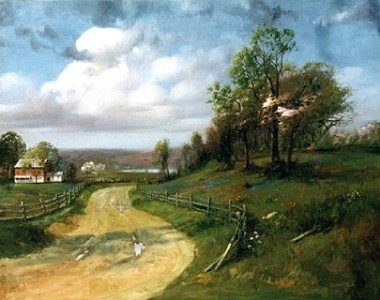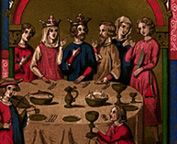

Sir Gawain and the Green Knight
Sir Gawain and the Green Knight is a poem written in the fourteenth century by an anonymous author. It describes the adventures of Sir Gawain, during which his morality is put to the test. The story develops around the Christmas game with the Green Knight. In this game the challenger, the Green Knight, proposes to exchange blows with an axe within a one-year interval. At the time Sir Gawain and the Green Knight was written, Sir Gawain was considered to be the most noble and admirable of the knights of the Round Table. His actions, therefore, in this poem, testify to the reader that his knightly honor is unblemished, despite the moral tests he is put through in the story. The main idea behind the poem is to show that the perfect Christian knight, is not just the strongest and bravest warrior, but also the most moral and honorable person. Therefore, Sir Gawain is tested in order for us to see if he is a perfect knight.

Image Source |
The second part of the poem (stanzas 1 through 3) presents us with a change in the poem's tone, as compared with the previous festival atmosphere of the castle. We are given a detailed description of passing time. The change in weather and all the surroundings seems to be governed by fate, but as the poet notices the "First things and final conform but seldom" (Norton, 212). The vivid description of passing clouds, "fostering showers"(212) and singing birds signifies the beginning of summer-time, which changes with the portrayal of harvest season, the ripening of the fruits and the turning of green grass into gray (Norton, 213), |
| The passage (stanza 3) tells us that on All Hallow's Day (November 1) King Arthur holds a major celebration in Sir Gawain's honor. All the knights of the Round Table are very sad, because they fear they will never see Sir Gawain again. Nevertheless they pretend to be cheerful for Gawain's sake, "Many mournful man made mirth for his sake" (213, line 542). After the feast, Sir Gawain asks King Arthur to leave the court, go on his quest and do what he is supposed to do as an ideal Christian knight. In the eyes of the readers (and the poet), |  image source |
In his final and very honest statement to the king, Sir Gawain says: "Why should I tarry? (And smiled with tranquil eye) In destinies sad or merry true man can but try"(Norton, 213). With this statement, Gawain admits that he believes it is his destiny to go and that he, as a "true man," must follow his fate. These words fairly echo the words from the epic Beowulf, "Fate often saves an undoomed man when his courage is good"(Norton, 34) which show that the same belief in fate and courage exists many years later. Therefore, if Sir Gawain is courageous and fulfills his promise, he may alter the outcome.
Throughout the poem, and in this passage, Sir Gawain represents the ideal knight both in his actions and words. The passage description of the changing climate, from summer to fall to winter (or from good to bad), foreshadows the moral tests that await Sir Gawain in the future. Up to this point in the poem, Gawain's reputation as being the perfect Christian knight is untarnished, but the outcome of the yearlong Christmas game will show readers just how perfect Sir Gawain is.
Works Cited
Abrams, M.H., ed., et al. The Norton Anthology of English Literature . Sixth Edition. Vol. I. New York : W.W. Norton & Company, 1993.